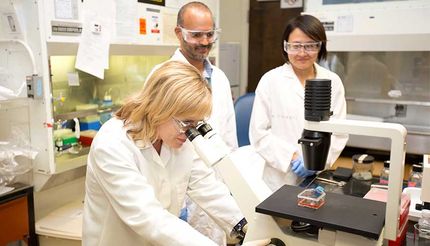GENimmune receives Orphan Medicinal Product Designation from European Commission for its hepatitis C monoclonal antibody
Advertisement
GENimmune, the newly created biopharmaceutical subsidiary of Innogenetics, announced that its candidate hepatitis C monoclonal antibody has been granted Orphan Medicinal Product Designation by the European Commission. The product is under development for the prevention of hepatitis C virus re-infection after liver transplantation.
As an outcome of its E1 research program, GENimmune has identified a series of HCV monoclonal antibodies that show potent neutralizing properties by blocking the infection of liver cells in vitro. The neutralizing properties were studied in collaboration with Dr. Robert Purcell's team at the Laboratory for Infectious Diseases, Hepatitis Viruses and Molecular Hepatitis Sections (NIAID, NIH, Bethesda, MD). These monoclonal antibodies provide a possible additional means to counter HCV infection after liver transplantation. Based on the solid preclinical data, GENimmune is developing these antibodies to prevent recurrent HCV-induced liver disease in liver transplant recipients. One antibody has been selected for the Orphan Medicinal Product Designation application.
The validity of GENimmune's different treatment approach for hepatitis C liver disease has also been recognized by the scientific community. An article describing the new monoclonals co-authored with NIH scientists has been accepted by the peer-reviewed Journal of Virology, and is scheduled for publication January 2008. Posters describing the properties of the monoclonals were also being presented at the annual International HCV Meeting in Glasgow, UK (Sept. 9-13) and at the Liver Meeting of the American Association for the Study of Liver Disease (AASLD) held in Boston, MA (Nov. 2-6).
Based on the criteria laid down in Regulation (EC) N° 141/2000, the European Commission has granted Orphan Medicinal Product Designation for GENimmune's lead recombinant human hepatitis C monoclonal antibody. The designation resulted from the positive opinion by the Committee for Orphan Medicinal Products (COMP).
Other news from the department research and development
Most read news
More news from our other portals
See the theme worlds for related content
Topic world Antibodies
Antibodies are specialized molecules of our immune system that can specifically recognize and neutralize pathogens or foreign substances. Antibody research in biotech and pharma has recognized this natural defense potential and is working intensively to make it therapeutically useful. From monoclonal antibodies used against cancer or autoimmune diseases to antibody-drug conjugates that specifically transport drugs to disease cells - the possibilities are enormous

Topic world Antibodies
Antibodies are specialized molecules of our immune system that can specifically recognize and neutralize pathogens or foreign substances. Antibody research in biotech and pharma has recognized this natural defense potential and is working intensively to make it therapeutically useful. From monoclonal antibodies used against cancer or autoimmune diseases to antibody-drug conjugates that specifically transport drugs to disease cells - the possibilities are enormous



























































